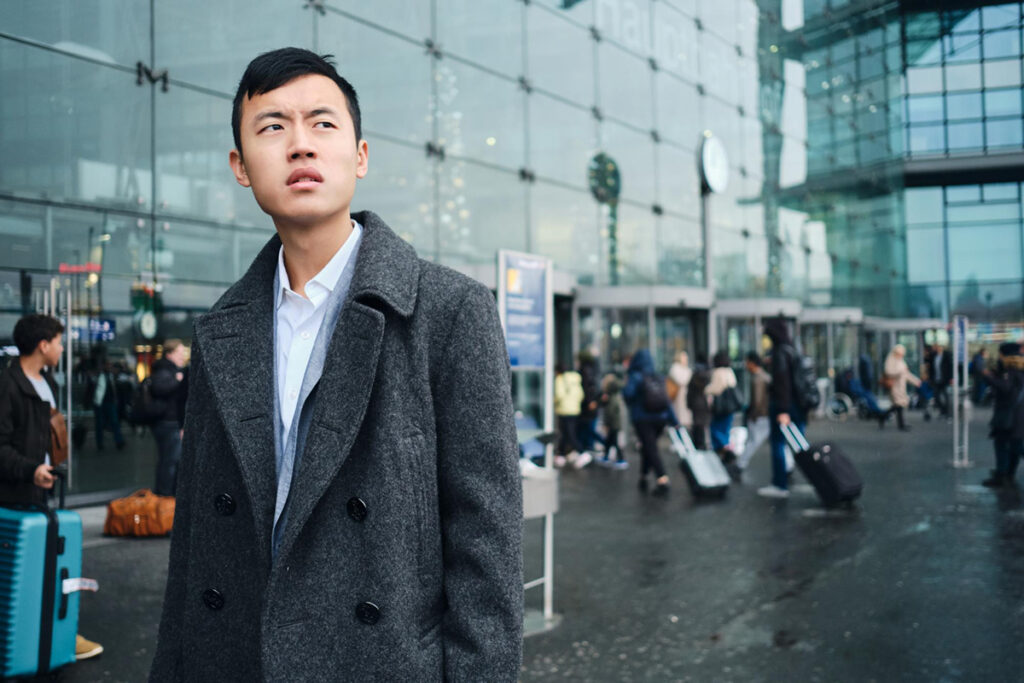By Irfan Shariff
NORTHWEST ASIAN WEEKLY
- Richard Herman
- Zahra Billoo
- Madhurima Paturi
- Xiao Wang
“Should I travel? I’m concerned about this.”
Richard Herman, an immigration lawyer, has received a lot of these calls recently. “We’re not here to create an alarmist mentality but it is good to be prepared.”
Herman and three other immigration rights advocates joined American Community Media on May 2 to provide “know your rights” guidance for travel during the Trump administration. The general advice was focused on travel for noncitizens, which will be different for citizens.
Everyone has rights at the border, but “depending on who you are, those rights will look and feel different,” said Zahra Billoo, executive director of the Council on American-Islamic Relations, San Francisco Bay Area. She advised everyone to practice the phrase, “‘I’m going to choose to remain silent,’ because if you’ve never said it before, you won’t say it under pressure. You won’t say it when you’re scared.”
“The harsh truth is that noncitizens do not have a right to enter the country. They are assessed for admissibility every time they present themselves at the border,” said Billoo. She recently heard of a story where a young man on a student visa postponed his wedding because he was worried he wouldn’t be allowed to reenter the United States.
The panelists shared anecdotes like this including Madhurima Paturi, another immigration lawyer. She has received over 300 calls from students with F1 visas at the end of March and early April. Their visa services were suddenly terminated.
“What we came to know was that close to 5,000 student visas got terminated within three weeks,” Paturi said. It was based on “some AI system looking for criminal checks” and that many of these students weren’t even charged by law enforcement.
“They just put everyone in one bucket and started terminating,” she said. Out of fear, many of these students self-deported.

“They have language barriers and they’re more vulnerable to pressure,” said Wang. He has seen cases where they’ve given up their right as legal permanent residents by signing a simple form.
“You do not have to, no matter how they present it, sign the Form I-407,” he advised. “They cannot revoke your green card. Only an immigration judge can do that, or if you give it up voluntarily.”
Broadly, the experts advise that everyone look at travel as a risk assessment and that noncitizens should minimize nonessential travel.
“There’s a lot of talk about not having the right to counsel at the border. That’s true,” said Billoo. But virtual counsel and documentation from a lawyer like an affidavit or G-28 document can help if you suspect you’ll have a sensitive border crossing due to things like past criminal convictions.
“People with complex immigration histories, like prior denials, prior violations or unresolved legal issues” are also at risk, according to Wang. “Don’t assume a border agent has final say. If something doesn’t feel right, ask questions. Everyone can protect their legal status and travel with more confidence.”
Last year, there were 400 million border crossings into the U.S., Herman said. “But only 0.01percent had electronic searches.” He expects that number to skyrocket.
“Americans do not have the right to decline electronic searches,” said Herman. He cites examples of American lawyers being held at the border and their phones confiscated and searched.
“We don’t really know what technology is being used,” he said. “They can retain data for up to 15 years.”
The general guidance is to disable biometric access to your phone.
“You can be forced to use your fingerprint or your face to unlock your phone but you can never be forced to turn over your password,” said Billoo.
“The Fourth Amendment right generally protects everybody but CBP has special authority called the ‘border exception,’ according to Herman. This isn’t only limited to the border but extends up to 100 miles out.
U.S. citizens “have an absolute right to re-enter the country,” said Billoo. She wants citizens to be proud of asserting their right to travel. “We need to protect our civil rights in this administration,” she said.
Billoo said that “there is a less than one percent chance that anything will happen to you [but] I don’t think any of us anticipate the Trump administration rolling back any of its anti-immigrant policies.”
“Whatever rights are taken away, stay eroded,” Herman added, and that the inflicted fear and anxiety has a major cost. He’s expecting a $64 billion loss in tourism this year.
To learn more and watch the American Community Media brief, visit: https://americancommunitymedia.org/media-briefings/who-dares-to-travel-now.





